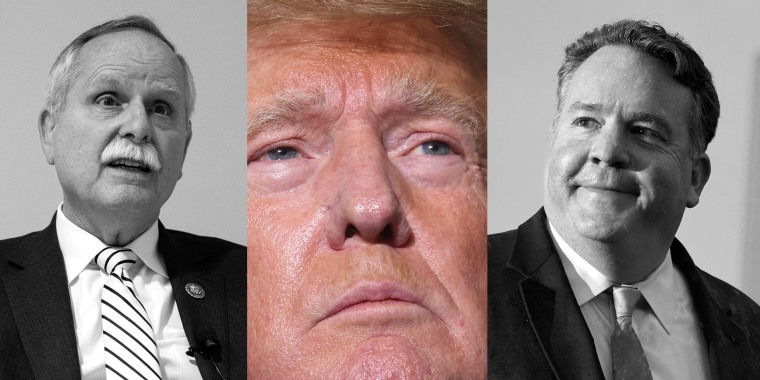Former President Donald Trump scored another victory as a Republican kingmaker on Tuesday, after his pick in West Virginia’s GOP primary, Rep. Alex Mooney, beat Rep. David McKinley in the race for the state’s 2nd Congressional District seat. As always, the display of Trump’s continued grip on the party is concerning. But there’s a specific detail about the race that’s particularly grim: McKinley was punished for the sin of indulging in an anodyne act of bipartisanship.
According to Roll Call, McKinley’s support for last year's bipartisan infrastructure law — you know, the law that received support from both parties in Congress and is funding badly needed roads, bridges and broadband infrastructure — was a “focal point in the race.” And McKinley’s vote for it is what inspired Trump to lash out against him. “Even though representatives for Trump told him a vote for the bill would result in Trump endorsing his opponent, McKinley said he couldn’t pass up an opportunity to vote for it because it ‘is good for West Virginia,’” Roll Call reports. When President Joe Biden signed his infrastructure package, Trump endorsed Mooney that same day.
Trump opposed the idea of voting for the infrastructure bill under Biden, purely out of a desire to denigrate Democrats.
It's a remarkable data point. Trump, of course, had wanted to pass an infrastructure bill himself while in office, but was too preoccupied waging culture wars to focus on getting the bill done. And infrastructure is one of those relatively unpolarized policy areas where it’s still not too difficult to garner votes from both parties. Biden’s 2021 infrastructure bill, which allocated hundreds of billions of dollars to help improve everything from public transit to the electrical grid to water pipes, passed both chambers by significant margins and received support from Senate Minority Leader Mitch McConnell, as well as West Virginia’s two senators, Democrat Joe Manchin and Republican Shelley Moore Capito.
But Trump opposed the idea of voting for the infrastructure bill under Biden, purely out of a desire to denigrate Democrats. “This will be a victory for the Biden administration and Democrats, and will be heavily used in the 2022 election,” Trump said in a statement as the bill was on the brink of becoming a law. “It is a loser for the U.S.A., a terrible deal, and makes the Republicans look weak, foolish and dumb.”
In this instance Trump somehow managed to make McConnell — a ruthless political operator who delights in killing legislation — look cooperative.
McKinley’s punishment also helps illustrate how much Trump-accelerated polarization has flipped the conventions of congressional politics on its head. Historically, a politician desperately wanted to be able to boast about what kinds of tangible goods and services they’d won for their district after trudging through the swamp of Washington politics. And McKinley probably thought that a bill that brought in billions for roads, bridges, expanded broadband and other things specifically for his impoverished state would be more important to constituents than the fact that he worked with his political opponents to get it.
But the new playbook of our political era dictates that McKinley doing the work of passing legislation is a liability. The key, an increasingly large number of Republicans believe, is not to craft policy or deliver goods and services for the public, but to grandstand and make the other party fail. Unfortunately, other Republicans will probably take note of the lesson McKinley just learned, and the prospects for bipartisan legislation in the future have grown even worse.

